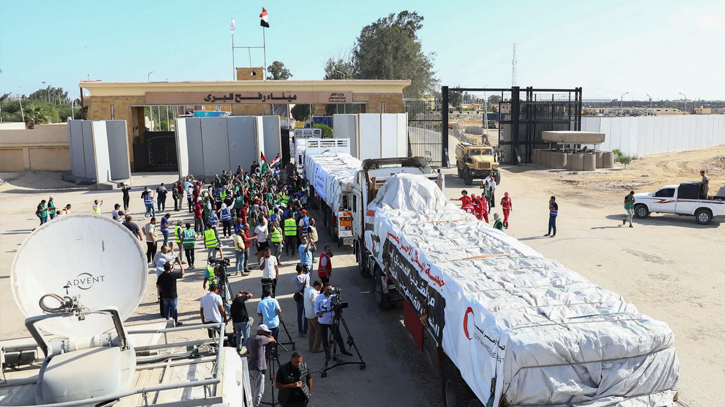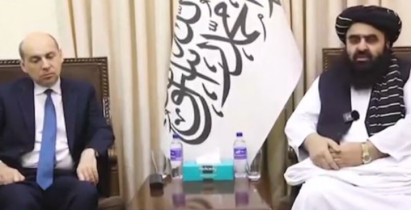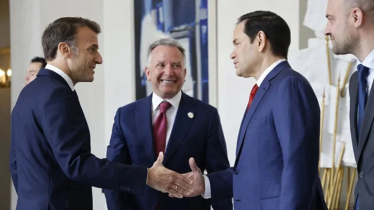
Photo: Collected
Egypt said Friday it has agreed to send United Nations humanitarian aid trucks through Israel’s main crossing into Gaza, but it was unclear if they will be able to enter the territory as fighting raged in the southern city of Rafah amid Israel’s escalating offensive there.
Meanwhile, the bodies of three more hostages killed on Oct. 7 were recovered overnight from Gaza, Israel’s army said Friday (24 May). The CIA chief met in Paris with Israeli and Qatari officials, trying to revive negotiations for a cease-fire and a hostage release.
Gaza’s humanitarian crisis has spiraled as the U.N. and other aid agencies say the entry of food and other supplies to them has plunged dramatically since Israel’s Rafah offensive began more than two weeks ago. On Friday, the top U.N. court — the International Court of Justice — ordered Israel to halt the Rafah offensive, though Israel is unlikely to comply.
At the heart of the problem lie the two main crossings through which around 300 trucks of aid a day had been flowing into Gaza before the offensive began.
Israeli troops seized the Rafah crossing into Egypt, which has been inoperative since. The nearby Kerem Shalom crossing between Israel and Gaza has remained open, and Israel says it has been sending hundreds of trucks a day into it. But while commercial trucks have successfully crossed, the U.N. says it cannot reach Kerem Shalom to pick up aid as it enters because fighting in the area makes it too dangerous.
As a result, the U.N. says it has received only 143 trucks from the crossing in the past 19 days. Hundreds of truckloads have been sitting on the Gaza side of the crossing unretrieved, according to Israeli officials, who say U.N. manpower limitations are to blame. U.N. and other aid agencies had to rely on the far smaller number of trucks entering daily from a single crossing in northern Gaza and via a U.S.-built pier bringing supplies by sea.
Humanitarian groups are scrambling to get food to Palestinians as some 900,000 people flee Rafah, scattering across central and southern Gaza. Aid workers warn Gaza is near famine. UNRWA, the main U.N agency in the humanitarian effort, had to halt food distribution in Rafah city because it had run out of supplies.
The Egyptian announcement appeared to resolve a political obstacle on one side of the border.
Israel says it has kept the Rafah crossing open and asked Egypt to coordinate with it on sending aid convoys through it. Egypt refused, fearing the Israeli hold will remain permanent, and demanded Palestinians be put back in charge of the facility. The White House has been pressing Egypt to resume the flow of trucks.
In a phone call with U.S. President Joe Biden on Friday, Egyptian President Abdel Fattah el-Sissi agreed to allow trucks carrying humanitarian aid and fuel to go to the Kerem Shalom crossing until a solution is found for the Rafah crossing, el-Sissi’s office said in a statement.
But it remained unclear whether the U.N. will be able to access additional trucks coming from Egypt.
UNRWA did not immediately reply to requests for comment. In a post on social media outlet X on Thursday, it said, “We could resume (food distribution in Rafah) tomorrow if the crossing reopened & we were provided with safe routes.”
Mercy Corps, an aid group operating in Gaza, said in a statement Friday that the offensive had caused the “functional closure … of the two main lifelines” of aid and “has brought the humanitarian system to its knees.”
“If dramatic changes do not occur, including opening all border crossings to safely surge aid into these areas, we fear that a wave of secondary mortality will result, with people succumbing to the combination of hunger, lack of clean water and sanitation, and the spread of disease in areas where there is little medical care,” it said.
Fighting appeared to escalate in Rafah. Bombardment intensified Friday in eastern parts of the city, near Kerem Shalom, but shelling was also taking place in central, southern and western districts closer to the Rafah crossing, witnesses said.
Israeli leaders have said they must uproot Hamas fighters from Rafah to complete the destruction of the group after its Oct. 7 attack.
Hamas-led militants killed around 1,200 people, mainly civilians, and abducted around 250 others in the Oct. 7 attack. Around half of those hostages have since been freed, most in swaps for Palestinian prisoners held by Israel during a weeklong cease-fire in November.
Messenger/Sumon








